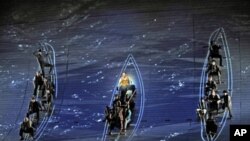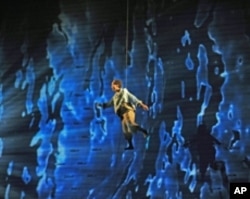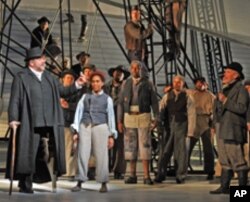"Moby Dick" is often called the great American novel, and a new American opera based on Herman Melville's epic tale is playing to rave reviews in Dallas, Texas.
It tells the story of Captain Ahab and his quest for revenge against the great white whale that destroyed his ship and bit off his leg.
The dramatic allegory of good and evil — first published in 1851 — has all the ingredients of grand opera, which is why it appealed to composer Jake Heggie.
Special effects
"It's a tremendous adventure story. It's got real human drama," says Heggie. "It makes sense for people to sing rather than say these words, because the emotions are so huge. The conflicts are so large and so real."
When he was approached about writing a work for the Dallas Opera company, Heggie convinced the artistic director he could turn the epic novel into a navigable three-hour opera. And he did.
Like the novel, the opera "Moby Dick" starts quietly. Brooding music conjures a restless sea. On the dark backdrop on stage, video-projected stars shine against a stark night sky. Constellations morph into navigational routes, which become sailing charts, and then form a ship.
Award-winning special effects artist Elaine McCarthy, whose credits include the Broadway hits, "Spamalot" and "Wicked," as well as operas, tried to match her projection design to the story.
"It's a very poetic work and if we went in there and made it a ship on the stage with a horizon line and the sky and the water, it would have just killed it," she says. So the stage itself becomes the ship deck, with masts, harpoons and rigging.
A realistic portrayal of Captain Ahab
One of the more literal translations from the novel is Ahab's peg leg.
Tenor Ben Heppner bends his left leg back so the stage crew can tie it up. It's hidden under his long coat with the peg attached at his knee. Heppner says there was no getting away from what, for him, is this opera's biggest challenge.
"It hasn't threatened to cramp, thank heavens," says Heppner. "But when I go out for that last entrance in Act 2, and then I know, from that moment on, I'm onstage until the end of the opera, I'm thinking, 'Oh boy, this is gonna be difficult.'"
On the other hand, Heppner says the music is anything but. A favorite scene occurs in Act 2, when Ahab almost gives up his chase for Moby Dick. Baritone Morgan Smith, as first mate Starbuck, sings the duet with Heppner. The tranquil scene follows a rough storm before the action again turns turbulent.
Smith sees the entire opera as a kind of storm, "characters spinning out of control, Ahab's descent into madness. .... Starbuck's descent into disorder, into a world where everything is going against what he knows to be true and right."
Hitting the right notes
The opera tells the story using Herman Melville's words almost verbatim. The performers praise Heggie's ability to turn that language into music.
The composer says Moby Dick forced him to work in a new way. "The combination of the sweep and scope of Melville's language, the beauty of the story, the depth of characters all pushed me into a whole new realm of composing and thinking of what music is onstage."
Music critics like James C. Taylor, who writes for Opera Magazine, felt Heggie hit just the right notes with his interpretation. "A lot of times American operas can feel cobbled together, the music is just sort of laid on top of an existing masterpiece. And with this, they integrated that nicely."
Taylor enjoyed the performance. "It's rare in any new opera for you to sort of lose sight of the fact that you're watching something new and get caught up in the action, and [with this work], you were able to follow it as musical drama, not just some new orchestral piece."
The Dallas opera co-commissioned Moby Dick with four other companies. The work travels to Australia next year, then moves on to Calgary, Canada, San Diego and San Francisco. Critic Taylor says he would not be surprised if additional companies pick up the opera in years to come, and add it to their repertoire.
Many new operas disappear after their world premieres. But this one, he says, has legs — or at least one good leg and a very strong peg leg.















